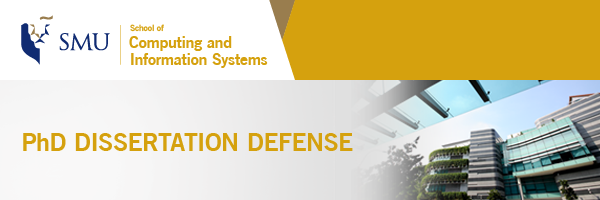| |
 Interactive Generative Modeling: A Pathway for Improved Simulation and Decision Making |  | CHEN Changyu PhD Candidate
School of Computing and Information Systems
Singapore Management University
| Research Area Dissertation Committee Research Advisor Co-Research Advisor - Arunesh SINHA, Assistant Professor, Department of Management Science & Information Systems, Rutgers Business School, Rutgers University
Committee Members External Member - Chao DU, Senior Research Scientist, Sea AI Lab, Singapore
|
| | Date 12 June 2025 (Thursday) | Time 9:00am - 10:00am | Venue Meeting room 4.4,
Level 4
School of Computing and Information Systems 1,
Singapore Management University,
80 Stamford Road
Singapore 178902 | Please register by 10 June 2025. We look forward to seeing you at this research seminar. 
|
|
|
| | ABOUT THE TALK This dissertation introduces Interactive Generative Modeling (IGM), a unified framework that integrates interactive paradigms with generative modeling to advance general-purpose intelligent systems. While reinforcement learning (RL) excels in complex simulated tasks but struggles to generalize in high-dimensional, open-ended domains, generative models, such as large language models pretrained on massive data, are highly expressive and serve as strong priors in these settings. IGM bridges these two paradigms to offer a new path toward more capable and generalizable AI.
The dissertation first explores IGM for Simulation, leveraging fine-grained, agent-level generative models to simulate multi-agent systems. Unlike traditional approaches that treat systems as indivisible wholes, this method decomposes simulations into interacting components, enabling richer and more informative interactions. This approach demonstrates particular strengths in data-scarce scenarios, with applications ranging from market simulations to image synthesis. IGM is also applied to Reinforcement Learning, where generative models are used to improve policy representations and provide robust priors for RL agents. Contributions include a normalizing flow-based policy architecture for large discrete action spaces and a self-improving framework for reinforcement learning from human feedback in natural language tasks. These methods enhance expressivity, annotation efficiency, and scalability, enabling RL agents to generalize across a wide range of tasks. Collectively, these findings position IGM as a promising foundation for building adaptive, efficient, and human-aligned agents. | | | SPEAKER BIOGRAPHY Changyu Chen is a Ph.D. candidate in Computer Science at the SMU School of Computing and Information Systems, co-supervised by Professors Pradeep Varakantham and Arunesh Sinha (Rutgers Business School). His research focuses on reinforcement learning and foundation model alignment. |
|